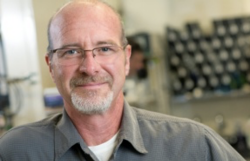
NORMAN, OKLA. – John Peters, Ph.D., chair of the Department of Chemistry and Biochemistry, Dodge Family College of Arts and Sciences at the University of Oklahoma, and his electron bifurcation team have won the prestigious Faraday Horizon Prize from the Royal Society of Chemistry. The team won the award for their biologically inspired discovery that captures energy from renewable sources.
The competitive international Horizon Prize celebrates groundbreaking developments that push the boundaries of science. The Royal Society of Chemistry has recognized excellence in the chemical sciences for more than 150 years.
The electron bifurcation team, a collaboration involving researchers from Duke University, the University of Georgia, the University of Kentucky, Montana State University, Arizona State University, Washington State University and the National Renewable Energy Laboratory, was the only North American team to win the 2023 Horizon Prize.
Peters, a presidential professor at OU, and the team successfully unraveled the rules underpinning how living systems split apart pairs of electrons into high- and low-energy pools without producing energy-wasting “short-circulating” reactions. Such reactions can be used to define new biologically inspired approaches to capture and manipulate energy from renewable sources.
“There is a lot of interest in the energy industry in upcycling fuels to make them more energy efficient and better for the environment,” Peters said. “Our research examines enzymatic catalysis and electron bifurcation to try to inform the Department of Energy about how to make better chemical reactions that would affect the energy industry.”
Peters joined OU in 2022 after serving as director and principal investigator of the U.S. Department of Energy-funded Biological Electron Transfer and Catalysis Energy Frontiers Research Center at Washington State University and Montana State University, where much of the research originated. Peters and the team submitted their application for the Horizon Prize while he was affiliated with Washington State University.
“The Dodge Family College of Arts and Sciences congratulates Dr. Peters and the electron bifurcation team on being selected for this highly prestigious recognition of their achievement,” said David Wrobel, dean of the college. “Throughout his career, Dr. Peters has consistently demonstrated creativity, innovation and leadership in fundamental electron transfer reactions in biology that are relevant to energy and agriculture. Dr. Peters joined OU last year from Washington State and brings an extensive record of excellence and national recognition in research. This honor illustrates the caliber of faculty we attract to OU who are driving our research mission forward.”
At Washington State University, Peters served as professor, director of the Institute of Biological Chemistry and special adviser to the Vice President for Research for Strategic Research Initiatives. He previously served as professor and chair of the Department of Chemistry and Biochemistry Undergraduate Program Committee at Montana State University.
Peters earned a bachelor’s degree in microbiology from the University of Oklahoma. He earned his doctorate in biochemistry from Virginia Tech University and was an NIH postdoctoral fellow at the California Institute of Technology. Peters also received the Cozzarelli Prize from the National Academy of Sciences in 2020.
For more information about the Faraday Horizon Prize, visit rsc.org.
About the University of Oklahoma
Founded in 1890, the University of Oklahoma is a public research university located in Norman, Oklahoma. OU serves the educational, cultural, economic and health care needs of the state, region and nation. For more information visit ou.edu.